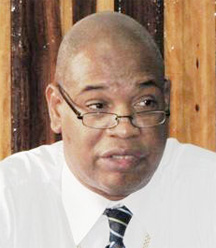Former Chairman of the Ethnic Relations Commission (ERC) and now Minister in the Ministry of Finance Juan Edghill says the cutting by the opposition of $99.4 million for the entity in this year’s budget has effectively shut it down as it cannot pay salaries nor meet its operating expenses like electricity, water and internet bills.
Addressing members of the media at a press conference held yesterday at the Ministry of Finance in his capacity as Minister within the Ministry of Finance, he said there is nothing that the Ministry could do to provide money to an entity that Parliament has not approved.
He said therefore that the future of the entity is to be determined by the constitutional mechanism to constitute the commission and by parliamentary voting.

“It would appear that persons do not realise that [the budget cuts] meant the closure of the ERC. As of today, the staff of the ERC has not been paid. I just concluded a meeting with the CEO of the ERC and the Finance Office [of the ERC] so as to ascertain what is available,” he said. He explained that an entity such as the ERC is entitled to 1/12th of the previous year’s allocation while waiting on the budget to be passed.
“Where we go from here after May [2012] is an issue that needs to be determined elsewhere,” he said. He said he found it strange that members of the media are quoting Opposition Members of Parliament who are saying that the ERC could function despite the budget cuts.
APNU MP Carl Greenidge in his motion last month to make the cuts stated that the ERC was not constituted and is not legal and hence APNU could not support monies being voted for it.
Edghill said that getting the ERC properly constituted is not left to dialogue or tripartite talks among the political parties, since the ERC is a constitutional body. He said that Parliament names the entities and those entities in turn make the nominations to the ERC. He debunked the notion that this process is determined between the Leader of the Opposition and the President in consultation.
“At the time the Opposition voted to cut the budget they were either unaware of the Constitution or pretended not to know and were on a path of misleading the public,” he said. He insisted that the only way to have a reconstituted ERC is by the constitutional process. “It is the entities that produce the commissioners and parliament approves the entities,” Edghill said.
Referring to the budget cut, he said that the $99.4 million that was cut by the Opposition was what the body would usually spend during the year. He said that in some years, the figure went above $100 million because of additional staff to facilitate the work of the body, such as facilitators and investigators deployed to the ten regions. He said that the sum of $99.4 million that was proposed was not an unusually high one. He said that staffing and all related expenses came up to a little over $40 million per year.
Edghill bemoaned the fact that some of the staff of the ERC reportedly visited the Opposition to plead with them about their plight.
“We are aware that some staff went to have talks with the Leader of the Opposition [David Granger] and [Khemraj Ramjattan of the Alliance For Change],” he said. “This was not a sanctioned activity by the ERC but an initiative by the staff members who felt threatened,” he said. However, Edghill feels the actions of these staff members have damaged their independence and that of the entity. “The ERC is supposed to be an independent body,” he stressed. “Apart of the combined Opposition cutting the ERC’s budget to $1, they have successfully compromised the staff of the ERC,” he said.
Further, he challenged members of the media and others who questioned his independence during the eight years that he chaired the ERC to come forward and show evidence that he was less than independent. “I would like to be judged on the eight years I have served as Chairman of the ERC [as to whether I could be accused of being biased]” he said. “I value my independence,” he said.
Reacting to questions regarding cuts to other government entities, the former ERC Chairman said that he cannot speak for those entities but said that all of those entities are facing the same dilemma. As far back as 2007, the PNCR – the main constituent – in APNU had had a problem with how the term of the ERC commissioners was extended. In October 2007, the late Winston Murray had said that in the interest of transparency and good governance, President Bharrat Jagdeo needed to explain the constitutional mechanism he used to extend the term of the commissioners of the ERC.
Said Murray: “There is no provision in the constitution for the President’s involvement in extending the life of the commission.”
After an impasse over the reconstituting of the ERC, the then PPP/C majority in Parliament had passed a motion calling on President Jagdeo to intervene. Following this motion, the President held a meeting and unilaterally extended the terms of the commissioners.
The life of the ERC commissioners came to an end on August 31, 2007 and the President on September 6, 2007 announced the re-appointment of the commissioners until consensus could be reached in parliament for consulting on new appointments. Regarding what mechanism the President had used to extend the term of the commissioners, Head of the Presidential Secretariat, Dr Roger Luncheon had said that it was out of necessity and following the parliamentary motion asking him to intervene. He said that the President had summoned a meeting with the stakeholders, including the commissioners and those who had put forward the names of the commissioners to serve in the first place, to ensure that there was general agreement for them to continue in office in the interim.





